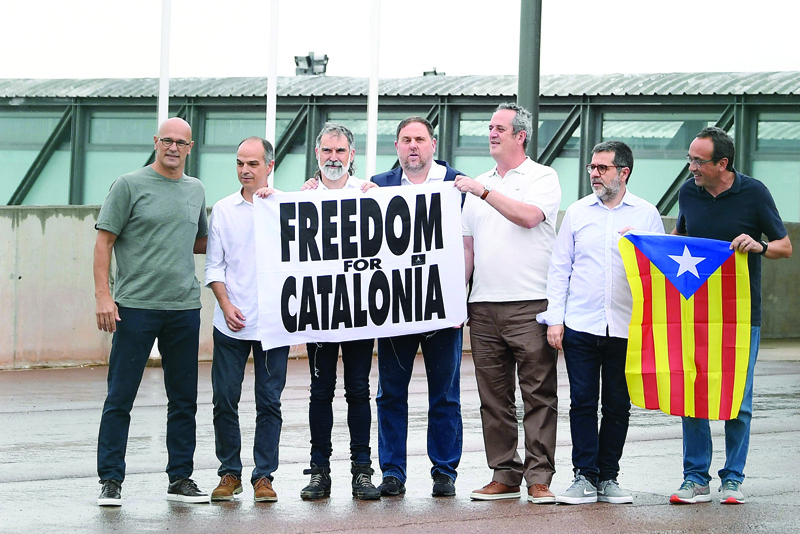 SANT JOAN DE VILATORRADA: (From left) Catalan separatists Raul Romeva, Jordi Turull, Jordi Cuixar Oriol Junqueras, Joaquim Forn, Jordi Sanchez and Josep Rull leave Lledoners jail yesterday in Sant Joan de Vilatorrada. - AFP
SANT JOAN DE VILATORRADA: (From left) Catalan separatists Raul Romeva, Jordi Turull, Jordi Cuixar Oriol Junqueras, Joaquim Forn, Jordi Sanchez and Josep Rull leave Lledoners jail yesterday in Sant Joan de Vilatorrada. - AFP
SANT JOAN DE VILATORRADA: Nine Catalan separatists who were serving long prison sentences for their role in a failed 2017 independence bid were released from jail yesterday, a day after being pardoned by Spain. The seven men left the Lledoners jail, some 70 kilometres (45 miles) northwest of Barcelona, where they were met in the rain by umbrella-carrying supporters shouting "Independence, independence!"
As they walked through the gates, they were embraced by newly-appointed Catalan leader Pere Aragones and posed for a photograph alongside a Catalan independence flag and a banner reading "Freedom for Catalonia", an AFP correspondent said.
"Long live a free Catalonia!" said Oriol Junqueras, who was deputy head of the Catalan government at the time of the crisis and the prisoner serving the longest sentence of 13 years. "Until the day of victory, we will continue to work with everyone to make this dream of a Catalan republic a reality."
Two women were also freed from separate prisons, just hours after the pardons for all nine separatists were published in the government's official gazette. The clemency decision was approved by the Spanish government on Tuesday in the hope it can draw a line under past confrontations with Catalonia's separatist-led regional leaders and open the way for talks.
The prisoners were serving between nine and 13 years each for their role in a banned referendum that was marred by police violence and followed by a short-lived declaration of independence in the wealthy northern region, sparking Spain's worst political crisis in decades. Some of those involved fled abroad, while 12 were tried and convicted with three-quarters of them handed years of jail time. Although the prison terms have been dropped, all nine are banned from holding public office and the pardons are conditional on them not committing "a serious crime" over the next three to six years.
They have all served more than three years behind bars. "I am here because the sacrifice they have made for Catalonia and for all of us has been huge," said Ignasi Sole, a 65-year-old retired mechanic who was waiting outside Lledoners prison for their release. "It's a way of thanking them."
'Independence through dialogue'
As they walked out, several of the prisoners pledged to continue the struggle. We will keep fighting," said Jordi Cuixart, head of Omnium, one of the region's biggest grassroots pro-independence groups, who was serving a nine-year sentence. "Today is not a day of surrender, it's a day in which all of us Catalans say we will continue to fight."
Leaving Was-Rad women's prison in Barcelona, former parliamentary speaker Carme Forcadell said they would work to secure a full amnesty that would allow those who fled abroad to return home. "Let's make this small victory work towards our greater victory: achieving an amnesty, self-determination and a Catalan republic," she said. The pardons have been condemned by Spain's right-wing opposition as well as by the Supreme Court, but Madrid hopes they will give impetus to the upcoming talks with Aragones who is more open to dialogue than his hardline predecessor.
Aragones and Junqueras, who heads the moderate ERC party, have recently taken steps towards Sanchez by distancing themselves from the path of unilateralism. "The best way to achieve (independence) is through dialogue, negotiation and agreement," said Aragones, who will meet with Spanish Prime Minister Pedro Sanchez for the first time on June 29. Aragones has pledged to push for an amnesty and a new referendum on self-determination-this time with Madrid's approval.
Spain has rejected both out of hand. When the separatists were sentenced in October 2019 by Spain's Supreme Court, the ruling triggered an outcry across Catalonia, with thousands hitting the streets in protests that sometimes turned violent. Although granting clemency may help calm tensions in Catalonia, analysts warned it would not solve the years-long turmoil over the separatist crisis, which has left the region sharply divided. The move was approved by more than two-thirds of Catalans but opposed by 53 percent of Spaniards, an Ipsos poll found. - AFP
.jpg)



